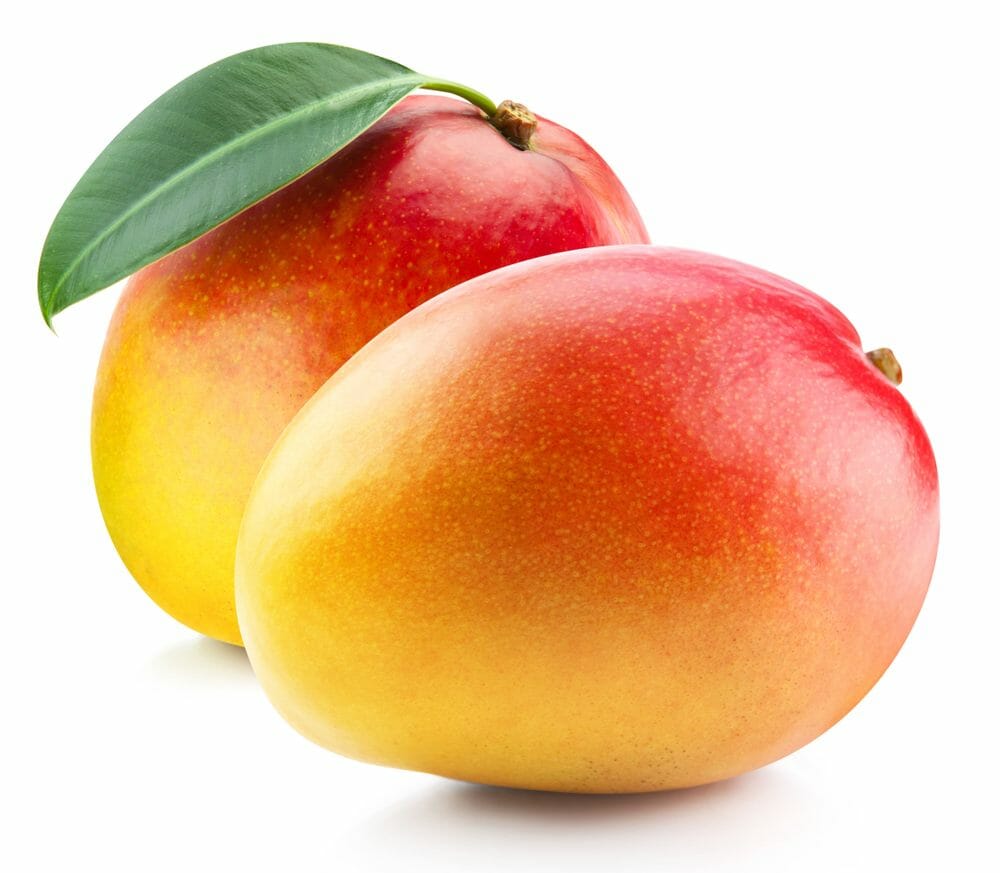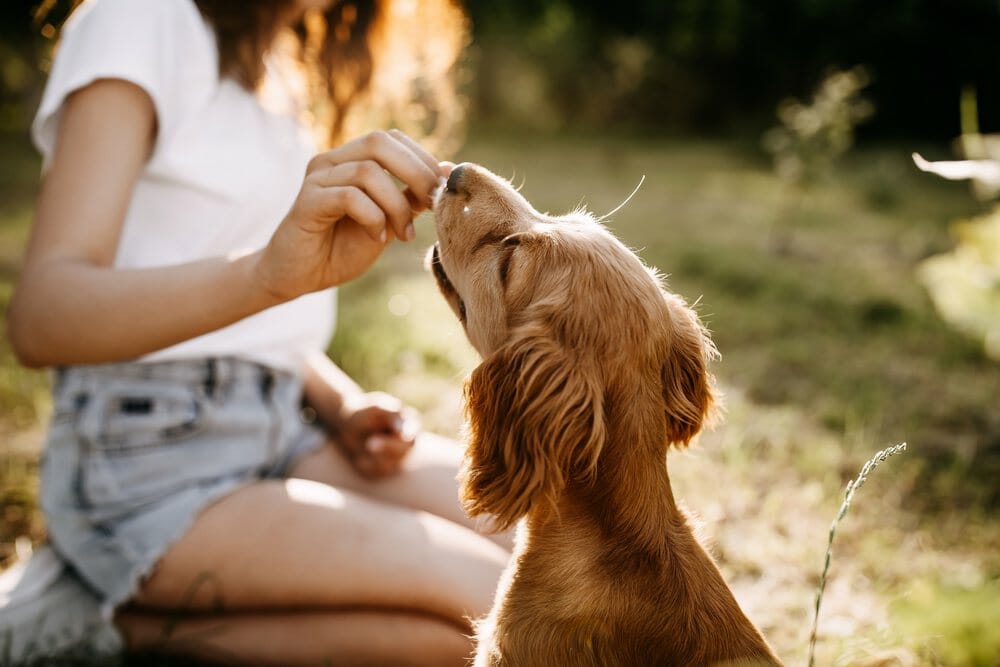Last updated: Jul 14, 2022
Mangoes are tropical fruits known for their sweet taste and soft flesh. For centuries, people have enjoyed this delicious fruit, especially in desserts, drinks, and smoothies.
So, can dogs eat mango? That’s the big question! Dogs have a different digestive system than humans, and the things we can eat aren’t always safe for canine consumption. As a responsible pet parent, your number one priority is learning what’s safe and not so safe for your dog to eat.

Some fruits that humans enjoy are toxic for dogs, so you always need to ask yourself whether sharing your fruity snack with your furry friend is a good idea. Since most dogs enjoy eating things they’re not supposed to (goodbye to my favorite pair of sneakers), you need to be vigilant and in the know so that you can make the responsible decision for your pet.
Remember, every fruit is different, and before you give anything to your dog for the first time, it’s a good idea to check that it’s safe for them to eat. Most times, only certain parts of the fruit are safe for your dog, or they should only have it in limited quantities.
So, can dogs eat mango, and are mangoes good for dogs? The short answer is yes. However, before hurrying off and sharing your fruity snack with your dog, there are a few things you need to know, as there is a right and wrong way to feed your dog mango.
Here’s everything you need to know about the suitability of mango for dogs so that you can avoid an upset stomach and a scary (and potentially expensive) trip to the vet.
Is Mango Good for Dogs?
Dogs can eat mangoes as a healthy snack or tasty treat. They are an excellent source of minerals like magnesium and vitamins, such as vitamin A, C, and K. Plus, they have protein, antioxidants (beta-carotene), and dietary fiber which supports good health and nutrition in both humans and dogs.
You will find that mangoes are suitable for dogs at any stage of life, from young pups to senior dogs, big and small, as they are a superfood, free from cholesterol, sodium, and fat.

Here are a few reasons why mangoes are good for dogs::
• Vitamin A helps improve eyesight, especially in senior dogs, preventing cataracts, dry eyes, and night blindness. It also enhances a dog’s coat and skin and helps the proper function of the lungs, kidneys, and liver
• Antioxidants help boost your dog’s immune system, defending against skin problems, degenerative diseases, allergies, and certain types of cancer
• Protein helps repair muscles and other vital body tissues
• Potassium helps improve your dog’s muscles and nerves. Your dog might suffer from frequent muscle injuries and appear weak if deficient in potassium. Adding mango to your pet’s diet can increase potassium levels
• Dietary fiber is excellent for your dog’s digestive system. It ensures everything runs smoothly in your dog’s digestive tract and alleviates symptoms of constipation and diarrhea when they have an upset stomach
• Vitamin B6 is needed for several bodily functions like the metabolism of fat, proteins, and carbohydrates. It’s also vital for ensuring your pup’s nails, coat, and skin remain healthy
• Magnesium and calcium play a role in keeping your dog’s heart, nervous system, and muscles functioning appropriately. They’ll keep your dog’s bones strong, regulate blood sugar, and support their immune system.
Can Dogs Eat Mango Skin?
No. While the skin isn’t toxic, it can be difficult for your dog to digest. It can also be quite tough to chew, causing a possible choking hazard. The skin can also irritate your dog’s skin and cause minor rashes and discomfort when not washed properly.
Mango skin contains urushiol, a component that’s also present in poison oak and poison ivy, and this is responsible for producing the rash on some pups’ bodies. If your dog is incapable of digesting the skin, it can result in stomach upsets, intestine blockage, and vomiting. Of course, this depends on the amount eaten.
You don’t have to be concerned right away if your dog eats mango skin, but ensure you keep an eye on them and contact your vet if you notice signs of obstruction like diarrhea and vomiting.

Can Dogs Have Mango Pits?
The mango pit or seed is also harmful to dogs, and you shouldn’t let your pup have access to it. It can pose a choking hazard and easily get stuck in the stomach or small intestine, causing pain and sometimes even life-threatening issues.
The pit also contains small amounts of cyanide, which can be detrimental to your dog’s overall well-being and digestion. While one pit or two likely isn’t fatal, it can definitely cause stomach pain and diarrhea. Most pits and seeds have trace amounts of amygdalin, a sugar and organic cyanide compound which degrades into hydrogen cyanide (HCN) when metabolized.
If you suspect your dog ate a mango pit (or many), check for possible blockage signs like:
• Abdominal pain
• Vomiting
• Diarrhea
• Lethargy
• Decreased appetite
• Constipation
• Difficulty breathing
• Stomach bloating
It’s best to act immediately by seeking emergency veterinary treatment because some of these symptoms can be life-threatening.
Is Mango Safe For Dogs?
Yes. Mango is safe for dogs when given in moderation, and the above-mentioned precautions are taken. However, when given too consistently or in large portions, mangoes can cause digestive issues for your pup because they are very fibrous.
Moderation and small quantities are your best bet because the fiber will keep your pup healthy, happy, and comfortable.

Another point to mention is the sugar content of mangoes. Mangoes contain sugars not present in regular dog food, making too much mango a concern for dental decay.
Mangoes can also be bad for dogs with underlying medical conditions like diabetes or pancreatitis. Such dogs require a specific diet to stay healthy, so consider your dog’s current health when deciding whether or not to treat your dog to some mango.
A Safe Treat Option For Your Dog
Mangoes should only be an occasional treat and should never replace a balanced meal. If your dog has underlying issues or is allergic to mangoes, there are better, tastier alternatives that can help meet their nutritional needs and requirements.
Spot and Tango offers a safe and wholesome treat for your dog by creating wet and dry dog food that’s good enough for humans to eat. One of the best mango alternative options you can try is the Spot and Tango Beef and Barley recipe, which includes cranberries.

Similar to mangoes, cranberries also have important nutrients, such as vitamin C, vitamin E, and Manganese. Therefore they are a good alternative to mangoes and a good treat for dogs. Cranberries are also filled with antioxidants to promote a healthy urinary tract for your dog.
The Beef and Barley range with cranberries exudes a delectable aroma from the moment you open the food pack, and not many dogs can turn up their noses at this recipe. It’s carefully planned and formulated by experienced vet nutritionists to meet and exceed the standards set by AAFCO’s Dog Food Nutrients Profiles.
Besides the cranberries, it includes USDA-grade beef – human-grade beef, so you know it’s the very best. It’s the perfect option if your dog is a fan of meaty meals and treats.
How To Feed Mango To Your Dog
Provided you follow the appropriate precautions, your canine companion can eat mangoes with no safety concerns. Here are some steps to ensure your pup enjoys all the benefits of mango for dogs:
1) Thoroughly wash the mango
2) Peel the skin off the flesh of the fruit
3) Remove the large central pit and ensure your dog can’t access it
4) Slice and dice the mango according to the size of your dog to give them a more manageable piece. Bite-sized pieces are better for smaller pups to prevent any chances of choking, while larger chunks can suit bigger dogs since the flesh is soft and easy to swallow.
You can feed the pieces to your dog immediately or freeze them for later. Frozen mango can keep your dog occupied a bit longer than a regular treat can, and it can help cool them down in the warmer months.
You can also dehydrate the mangoes to create the perfect on-the-go snack for your pup. Dehydrated mangoes are easier to transport and store than fresh mangoes, so they’re great when taking a trip with your dog. You can dehydrate them alone or combine them with other food. It’s not a good idea to buy commercially dried fruit for your pet as this is packed with sugar and sodium, which is undoubtedly unhealthy.
For rapid dehydration, cut thin slices, or if you want crispy slices, keep the mangoes in the dehydrator for longer. Crispier pieces will last longer than chewy ones in an airtight container. You can also use an oven on low settings if you can’t access a dehydrator.

Ensure you never give your dog mangoes that have gone bad. Ethanol or alcohol becomes present in rotten fruit, and this can be poisonous for your dog. Alcohol poisoning can result in symptoms like tremors, vomiting, and seizures, requiring immediate veterinary attention.
Frequently Asked Questions
Is Mango Bad For Dogs?
No. Mangoes can only be bad for dogs if you give them too much or if they have underlying health conditions like diabetes, because of the high sugar content. Giving mango skin to your dog can cause indigestion, irritation, and discomfort, while the pit can result in choking hazards that can be life-threatening. However, your dog can safely enjoy mangoes if you take out the skin and pit and feed them mango flesh in moderate quantities.
Can Dogs Eat Dry Mango?
Yes! Dry mango can be a great treat option if you plan to take a trip with your dog. You can make them crispy to last longer and give them to your pup while on the move. Dried mango (if not commercially dried) will still have the same nutritional benefits and will not harm your dog in any way.
Can Puppies Eat Mango?
Yes! Mangoes are suitable for dogs at all life stages, including puppies and seniors. For small dogs and puppies, ensure you give small amounts according to their weight and slice the mango into small pieces to avoid any chance of choking.
Can Dogs Eat Mango Seeds?
No. You should never give mango seeds or pits to your dog. They present a real choking hazard because they can easily get swallowed and block the stomach or intestines. The seeds can also contain small amounts of cyanide that can harm your dog’s health and well-being. Always throw away the seed and ensure your dog can’t easily reach it. If your dog swallows a mango seed or pit or you’re unsure if they have, consult your vet immediately for appropriate advice.
Conclusion
So, can dogs eat mango? Yes. Are mangoes good for dogs? Absolutely. As evidenced above, mangoes are a healthy, tasty treat for your dog with numerous health and nutritional benefits.
However, you have to remember not to give too much mango to your dog and to take out the skin and pit to avoid indigestion and choking hazards.
Spot and Tango make things easier by allowing you to build a personalized meal plan for your pup according to their profile and dietary needs. Then, with every meal cooked to order, it’s packaged, frozen to preserve freshness, and delivered to your doorstep only days after preparation.
Want to Learn More?
• Can Dogs Eat Grapes?
• Can Dogs Eat Cranberries?
• Can Dogs Eat Turkey?
• Can Dogs Eat Apples?
• Can Dogs Eat Yogurt?




















